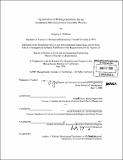Optimization of kitting operations for an automated microelectronics assembly process
Author(s)
Williams, Gregory A. (Gregory Alan)
DownloadFull printable version (7.414Mb)
Other Contributors
Leaders for Manufacturing Program.
Advisor
Roy E. Welsch and David Simchi-Levi.
Terms of use
Metadata
Show full item recordAbstract
Raytheon's Solid-State Microwave (SSM) manufacturing area produces a low-volume, high mix assortment of Microwave Integrated Circuits (MIC) for airborne radars. The current kitting process for pick-and-place assembly is manually-intensive with significant die handling, resulting in multiple opportunities for damage and loss as well as accidental switching of near-identical components. These defects are difficult to detect and are often not discovered until the completed MICs are tested, by which time significant value has been added. The core of this project was to reduce kitting defects, total process cycle time and overall cost through reduction of "touch" labor and kit screenings. The establishment of customized die packaging requirements will result in the optimization of die packaging before the material is received into the storeroom. These new packaging requirements, in combination with the implementation of a point-of-use store for residual materials on the factory floor, enables in large part the elimination of the kitting process, resulting in significant reduction in handling and correlated reductions in lost or damaged parts and "wrong part" defects. (cont.) This initiative was piloted on a single MIC line, but the solution was designed to be portable to other areas of SSM/SCM kitting operations. This thesis documents the process by which the new process was developed and piloted at Raytheon, as well as the organizational issues and barriers that made the project implementation challenging. In particular, successful implementation of the new processes will require a major shift in organizational thinking towards Total Cost of Ownership and greater cooperation across the boundary between the Solid-State Microwave and Supply Chain Management organizations.
Description
Thesis (S.M.)--Massachusetts Institute of Technology, Dept. of Civil and Environmental Engineering; and, (M.B.A.)--Massachusetts Institute of Technology, Sloan School of Management; in conjunction with the Leaders for Manufacturing Program at MIT, 2006. Includes bibliographical references (p. [73]).
Date issued
2006Department
Leaders for Manufacturing Program at MIT; Massachusetts Institute of Technology. Department of Civil and Environmental Engineering; Sloan School of ManagementPublisher
Massachusetts Institute of Technology
Keywords
Civil and Environmental Engineering., Sloan School of Management., Leaders for Manufacturing Program.